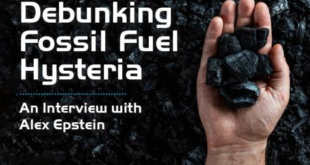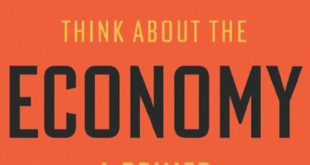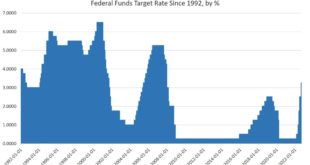Money is one of the most misunderstood topics of our time, and we’re seeing the implications of this play out every day. To understand money, one first must first understand that human beings have always been incentivized to participate in exchange. If humans could not, or did not, trade, most people would die young from starvation, disease, or exposure to the elements. The survivors would be left with an extremely low standard of living in a world in which none of...
Read More »Should the Fed Increase the Money Supply in Response to a Growing Economy?
Most commentators believe a growing economy requires a growing money stock because economic growth gives rise to a greater demand for money, which then must be accommodated. Failing to do so will lead to a decline in prices of goods and services which, in turn, destabilizes the economy and leads to a recession or, even worse, depression. The main role of the Fed, then, is to keep the supply and the demand for money in equilibrium. An increase in the demand for money...
Read More »Debunking Fossil Fuel Hysteria: An Interview with Alex Epstein
Jeff Deist: Alex Epstein is our special guest this week. He runs the Center for Industrial Progress, was formerly at the Ayn Rand Institute, and has a background in philosophy. He wrote a famous book called The Moral Case for Fossil Fuels, and followed that up with a new book called Fossil Future. Alex, let me say this book is incredible. Thank you for writing it! I know from the acknowledgements it was quite a difficult task. Alex Epstein: I did the book on fossil...
Read More »How to Think about Economic Theory
[Chapter 2 of Per Bylund’s new book How to Think about the Economy: A Primer.] Like other sciences and fields of study, economics is a body of theory. Theory is a collection of explanations that allows us to understand something. Economic theory allows us to understand how an economy works. It explains the workings of the economy as a whole so that we can understand the meaning, impact, origins, and evolution of economic phenomena. For theory to be reliable and...
Read More »Seeing the Student Loan Crisis as a Form of Boom and Bust
Sorry, I've looked everywhere but I can't find the page you're looking for. If you follow the link from another website, I may have removed or renamed the page some time ago. You may want to try searching for the page: Search Searching for the terms %3Futm+source%3Drss%26utm+medium%3Drss%26utm+campaign%3Dmacleod+seeing+student+loan+crisis+form+boom+bust ...
Read More »The Other Immigration Question: Should People from Wealthy Countries Migrate to Poorer Ones?
The immigration debate has polarized societies across the Western world. Objectors assert that the influx of migrants has corroded social relations, and defenders argue that immigrants release a dose of entrepreneurial dynamism. Debates will persist because it’s unlikely that people can be discouraged from migrating to rich countries in the West. Migrants will continuously flock to places like America and Canada, since they provide better opportunities. Besides...
Read More »The Idea of Liberty Is Western
[This article is excerpted from chapter 21 of Money, Method, and the Market Process, a collection of essays selected and edited by Margit von Mises and with an introduction by Richard M. Ebeling.] I The history of civilization is the record of a ceaseless struggle for liberty. Social cooperation under the division of labor is the ultimate and sole source of man’s success in his struggle for survival and his endeavors to improve as much as possible the material...
Read More »The Fed Is Finally Seeing the Magnitude of the Mess It Created
When asked about price inflation in his Sunday interview with 60 Minutes, President Biden claimed that inflation “was up just an inch…hardly at all.” Biden continued the dishonest tactic of focuses on month-to-month price inflation growth as a means of obscuring the 40-year highs in year-over-year inflation. This strategy may yet work to placate the most ignorant voters, but people who are paying attention know that price inflation continues to soar. Thus, while...
Read More »What Economics Is
[This article is chapter 1 from Bylund’s new book How to Think about the Economy: A Primer.] Economics is an exciting field. The economics of old sought to uncover how the world works. It showed, or even proved, that there is a natural order to it. There is structure to the apparent chaos. The economy has something of a life of its own: it has a nature. This means not only that we can study it and learn about its ways, but also that we are not free to tamper with it...
Read More »Does Capitalism Itself Create Economic Instability or Is Central Banking the Culprit?
Instability in financial markets has brought back the ideas of post-Keynesian school of economics (PK) economist Hyman Minsky. Minsky held that the capitalist economy inherently is unstable, culminating in severe economic crisis, accumulation of debt being the key mechanism pushing the economy toward a crisis. During “good” times, according to Minsky, businesses in profitable areas of the economy are well rewarded for raising their level of debt. The more one borrows...
Read More » Swiss Economicblogs.org
Swiss Economicblogs.org









